Riley Adams's Blog, page 134
May 31, 2014
Twitterific Writing Links
by Elizabeth S. Craig, @elizabethscraig
Twitterific links are fed into the Writer’s Knowledge Base search engine (developed by writer and software engineer Mike Fleming) which has over 23,000 free articles on writing related topics. It’s the search engine for writers.
Why Is The Media Ignoring Author Exploitation By Publishers? http://ow.ly/xsDMq @DavidGaughran
“Do I Have Writing Talent?” You’re Asking the Wrong Question: http://ow.ly/xmhxG @writerunboxed @suzannahwindsor
Editing Etiquette | The Steve Laube Agency: http://ow.ly/xmj9z
5 Ways to Get to Know Your Character: http://ow.ly/xmhME @Janice_Hardy
Book Clubs Mean Business http://ow.ly/xmiWI @NicholeBernier
3 Insights That Lead to Successful Publishing Careers: http://ow.ly/xmix9 @Janefriedman
5 Steps To Reading Critically: http://ow.ly/xmj14 @woodwardkaren
Self-publishing authors and literary agents – do they mix? http://ow.ly/xmi7u @Alison_Morton
15 Articles on Cover Design for Self-Publishers: http://ow.ly/xmhJz @jfbookman
Will the Hachette/Amazon Battle Encourage Authors to Self-Publish? http://ow.ly/xmi3d @Goodereader
Inside a Screenwriter’s Mind: ‘Vomit Drafts’ and ‘Land of Lost Scenes’: http://ow.ly/xmit7 @BAHjournalist
Melville had everything a young author could dream of. Then he wrote Moby-Dick and ruined everything: http://ow.ly/xmhPG @mental_floss
Things a writer wishes he knew about creating characters when he started writing: http://ow.ly/xmjpB @ChrisAndrewsAU
Marketing & Selling: The Same? http://ow.ly/xmic4
Writing Agreement # 1: Be Impeccable with Your Word: http://ow.ly/xmjBu @KCraftWriter
How to Use Reader Feedback to Improve Your Writing: http://ow.ly/xmjg8 @CKMacLeodwriter @CarlaJDouglas
10 Common Types of Writer’Â’s Block (and How to Overcome Them Quickly): http://ow.ly/xmhqt @NikkiWoods
How to structure your story: tips from Joseph Campbell’s mythology http://ow.ly/xmYGr @nownovel
Writers’ Anxiety: Less Prozac, More Presence http://ow.ly/xmZdZ @bentguy1 @writerunboxed
Creating Archetypal Characters: http://ow.ly/xmZfv @glencstrathy
So You Want to Write a Cocktail Book… http://ow.ly/xmYqH @dietsch @seriouseats
Writing Warfare in Fantasy: A Guide to the Battle Scene: http://ow.ly/xmYSW @mythicscribes
What It’s Like to Work for J.D. Salinger’s Agent: http://ow.ly/xmYyl @NewYorkObserver @kbsmoke
3 Times You Should Stop Writing: http://ow.ly/xmYmC @EmilyWenstrom
Should Authors Stick To One Genre? An Interview With Linda Gillard: http://ow.ly/xmZ8S @joannegphillips
Self-publishing is not revolutionary – it’s reactionary: http://ow.ly/xsDx3 @guardianbooks
Screenwriting: Why Joe Everyman is A Terrible Lead: http://ow.ly/xgJTS @DrewChial
Creating Stunning Character Arcs: The Resolution: http://ow.ly/xgJuf @kmweiland
Do Self-Publishing Authors Earn More? http://ow.ly/xgKqD @OrnaRoss
On Writing Secondary Characters: http://ow.ly/xgK8m @carlywatters
Simultaneous subplots: http://ow.ly/xgJ8N @vgrefer
Advice On Writing For Writers From Writers: http://ow.ly/xgKJu @NikkiWoods
4 Signs That You’re Not Writing Enough…and 4 Things You Can Do About It: http://ow.ly/xgK3p @naturithomas
The Tenured vs. Debut Author Report: http://ow.ly/xgJ5x @HughHowey @AuthorEarnings
The Straight Dope on Publishers Marketplace: http://ow.ly/xgJiO @literaticat
What’s in a Pen Name? http://ow.ly/xgJG2 @John_Wray @newyorker
Author Entrepreneur. Why Being An Indie Author Is A Great Business Model: http://ow.ly/xgJzE @thecreativepenn
Do Men Receive Bigger Book Advances Than Women? http://ow.ly/xgJcQ @JaneFriedman
Trigger Warnings and the Novelist’s Mind : http://ow.ly/xgJpD @jaycaspiankang @newyorker
15 Greatest Character Names In American Film History http://ow.ly/xgIYq @whatculture
Should Writers Compare Themselves to Other Writers? http://ow.ly/xgJwv @noveleditor
Know Your Genre: Tips and Secrets from the Experts for Writing Bestselling Genre Fiction: http://ow.ly/xgK0R @RuthHarrisBooks
“Dying Clues” in Crime Fiction: http://ow.ly/xqGOX @mkinberg
How To Market A 99 Cent Ebook Sale On The Cheap: http://ow.ly/xn6iy @mollygreene
Beyond the shoot-em-up: how gaming got killer stories: http://ow.ly/xeEAB @SimonParkin
10 English Words And Phrases That Folks Use Incorrectly: http://ow.ly/xeE4d
Symbols for Writers: the Snake: http://ow.ly/xeL6u @CherylRWrites
Tips For Writing Action http://ow.ly/xeENw @joecraiguk
What to do when you feel out of touch with your creative energy: http://ow.ly/xeDX4 @gointothestory
How to Make Word Behave Like Scrivener http://ow.ly/xeLfB @byondpapr
Owning Our Words: Gatekeepers and Gender in Children’s Books http://ow.ly/xeEtf @KateMessner
Alice Hoffman: 5 tips to help you write your novel : http://ow.ly/xeKEz @salon
When to Consult a Medical Expert for Our Writing: http://ow.ly/xeKz8 @JordynRedwood
The War Of Art: http://ow.ly/xeLaj @write_practice
The internet isn’t harming our love of ‘deep reading’, it’s cultivating it: http://ow.ly/xeEIT @stevenpoole
Writers Sometimes Make Up a New Word. Here Are Some of the Best: http://ow.ly/xeEnN @bluepencil2
The three ages of becoming a writer: http://ow.ly/xeKZX @roz_morris
‘I am not accessible’ : http://ow.ly/xeKQh @haleshannon
7 Tips for Writing Better Sex Scenes: http://ow.ly/xeLyr @wordsprof
Some Hollywood Advice for Shakespeare: http://ow.ly/xeE9T @kaskew
Walking Away from the Stress of the Big Release�: http://ow.ly/xmEDf
9 Poems To Change Your Mind About Poetry: http://ow.ly/xbKDo @_RobbieBlair_
Do your characters exist beyond FADE OUT? http://ow.ly/xbKvq @gointothestory
The retailer-publisher chill: http://ow.ly/xmdQF @Porter_Anderson @DavidGaughran @author_sullivan
Author Tips and Tricks: http://ow.ly/xbL91 @AuthorKSBrooks
How To Pick The Right Genre For Your Novel (And Why Your Sales Depend On It): http://ow.ly/xbKrN @writetodone
Despair, Depression– Give up or Fight back? http://ow.ly/xbKMy @SR_McKade
How Not to Begin Your Novel: http://ow.ly/xbLCg @jawlitagent
Help with accents and dialects: http://ow.ly/xbM6y
Underlying themes in crime fiction: http://ow.ly/xmcDj @mkinberg
Treating Your Writing Like A Full-Time Job: http://ow.ly/xbLqV @Jen_328
10 Truths for Self-publishers: http://ow.ly/xbKZi @AP_Fuchs
Using Photographs to Tell Your Story: http://ow.ly/xbKTL @cateartios
8 tips to get the most out of attending a writers’ conference: http://ow.ly/xbMmd @michellerafter
What Makes a Good Book Marketer? http://ow.ly/xbKm2 @selfpubreview
The Writer’s Force – A Word on Depression: http://ow.ly/wXLOg @MikkiKells
How to Show a Character’s Internal Journey: http://ow.ly/wXL9v @jamigold
7 Famous Authors Who Were First Published After 50: http://ow.ly/wXL0L @phildiederich
Nonfiction: How to Write Good Sales Copy for the Back of Your Book: http://ow.ly/x9xg8 @NonfictionAssoc
The 15 Principles Of Highly Successful Authors: http://ow.ly/x9vgb @thatwritergirl
How To Write A Terrific Murder Mystery: http://ow.ly/x9u8Y @woodwardkaren
Nonfiction: How to Write a Competitive Title Analysis: http://ow.ly/x9vjG @NinaAmir
How to Use a Sprint Journal: http://ow.ly/x9wXM @ramonadef
Sentence Writing 101 – Excision: http://ow.ly/x9v0r @Massim0Marin0
Tips for stripped-down writing: http://ow.ly/x9vsB @NakedEditor
Publishing: Rules are Rules (except when they aren’t) http://ow.ly/x9vIi @rchazzchute
2 Plot Tips for Tying Character Motivation to Theme: http://ow.ly/x9uKZ @plotwhisperer
BEA’s new Author Hub schedule: http://ow.ly/xjcLY @Porter_Anderson #BEA14
15 Things to Know About Book Events: http://ow.ly/x9uss @jennymilchman @btmargins
The Psychological Benefits of Writing: http://ow.ly/x9woE @GregoryCiotti
The Subplot – Not Second Place, but Side by Side: http://ow.ly/x9vAI @AnthonyEhlers
How music affects your productivity: http://ow.ly/x8VjV @GregoryCiotti
Why do we write? http://ow.ly/x9u4a @momentumbooks
How to Be a More Concise Writer: http://ow.ly/x9wgZ @ErinMFeldman
The Author’s Public Face: http://ow.ly/x9v8u @megmims
Amazon v Hachette: Don’t Believe The Spin: http://ow.ly/xgIUF @DavidGaughran
Author Platform: Here’s What All the Fuss Is About: http://ow.ly/x6Llq @thewritelife
Tips for Cleaning up a Manuscript: http://ow.ly/x6LfN @noveleditor
Is Dialogue Really That Important? http://ow.ly/x6LbJ @screencrafting
How to handle disagreements with your editor: http://ow.ly/x6I0L @rachellegardner
Who is Goliath in Publishing? http://ow.ly/x6JBK @HughHowey
The Responsibilities of a Small Press Author: http://ow.ly/x6J58 @AlyConnerBrown
3 Things to Know About Exposition & Telling: http://ow.ly/x6J8h @victoriamixon
5 Things Filmmakers Should Stop Doing Right Now: http://ow.ly/x6IhI @vidandfilmmaker
Product Review: Scrivener: http://ow.ly/x6Luv @chris_shultz81
When can novelists break the rules? http://ow.ly/x6IVV @wendylawton
Working a Paranormal Element into Mysteries: http://ow.ly/xgzYk @MarsaliTaylor
7 Free-to-Enter National Writing Competitions: http://ow.ly/x6JKo @writersdigest
What tools did famous authors use to write their popular books? http://ow.ly/x6Iq0 @chrisrobley
Out of the Woods: http://ow.ly/x6JU5 @Kathy_Crowley
Good Online Author Etiquette for Blogging, Twitter, Comments: http://ow.ly/xg2n1 @alexjcavanaugh
5 Techniques To Develop Your Short Story Into A Novel: http://ow.ly/x6LEG @writersrelief
Embracing The Imperfect with Annie Lammott: http://ow.ly/x6JXF @ornaross
5 Lessons In Creativity And Crime Writing From Jo Nesbo: http://ow.ly/x6Jm9 @fastcompany @JessGrose
Book Boss Jane Friedman Talks Tech, Ebooks and Why Content Still Rules: http://ow.ly/x6Ixs @JaneORIM @forbes
Keys to Revising Your Script for 1st Time Screenwriters: http://ow.ly/x2X81 @screencrafting
Don’t Ever Do It For the Money: A Conversation with an Agent: http://ow.ly/x2XmG @EdanL
Writer’s Resource: Create a calendar (with moon phases) for any month in history: http://ow.ly/xfdyx @sarawhitford
Story Arc in a Nutshell http://ow.ly/x37KX @lihauthor
Will the Agency Model Survive? http://ow.ly/x2XCz @passivevoiceblg @PublishersWkly
How To Write a Book from Start to Finish: http://ow.ly/x2XGR @joebunting
An Agent on Posting your work for online crits: http://ow.ly/x2XXk @janet_reid
The post Twitterific Writing Links appeared first on Elizabeth Spann Craig.
May 29, 2014
Exercise and Writing
By Elizabeth S. Craig, @elizabethscraig
I’ve never been a fan of exercising, although I’m trying to do better. I’ve read a slew of articles lately about the connection between exercise and creative thought.
One of these articles is this one by Fiona Macrae, a science correspondent at the Daily Mail. The article is: “If you’re looking for that big idea, just go for a walk: Study reveals people are up to twice as creative when on their feet.”
The article states: Dr. Oppezzo, of Santa Clara University in California, did a series of experiments in which people undertook tests of creativity, such as playing word association games, while walking or while sitting at a desk.
In one experiment, the volunteers came up with twice as many clever ideas when walking.
When I’m walking, my mind usually wanders to the current work in progress. I was about ¾ of a mile away from my house last week when I realized that I had a plot hole involving Myrtle’s cat, Pasha in the current scene I was writing. I didn’t have my phone on me, so I spent the rest of my walk murmuring, “Pasha the cat” to myself. It’s a wonder the neighbors haven’t called the men in white coats to come pick me up.
So that’s specific to walking. But, of course, there are other reasons to exercise besides stimulating creativity. Writing is a sedentary activity, although there are some who have made the change to standing desks. Sometimes I’ll write at the kitchen counter, in lieu of a standing desk. (More about “easing into standing desks” in this article by Thorin Klosowski for Lifehacker.)
Galley Cat ran an article a couple of years ago (written by Jason Boog) called “Don’t Let the Writing Life Kill You.” The article linked to five free fitness and workout apps for smartphones.
For those of us who are more limited to a desk during the day, WorkAwesome blog posted “Five Desk Exercises for Your Busy Office Life.” The exercises work, among other things, our lower backs, shoulders, and abdomens.
One of my favorite finds was, again, at the Lifehacker blog. They linked to an app called the 7 Minute Workout App. It works just fine on a laptop, too. The Lifehacker link shows how to properly do the exercises (which I’m sure I wasn’t doing correctly until I watched the video). My favorite thing about the exercises is that they’re only 30 seconds each. :) Although it’s possible I might cheat on a couple of them, just the same.
So, that’s my public service announcement for the month—let’s try to exercise. Which reminds me of my last public service announcement…back up your work. If we do both these things as writers, we’ll likely be a lot better off.
Do you have an exercise regimen, or are you kind of all over the place with exercise, like I am? Have you found that exercise, specifically walking, helps you with your writing?
Image: MorgueFile: Keyseeker
The post Exercise and Writing appeared first on Elizabeth Spann Craig.
May 27, 2014
Walking Away from the Stress of the “Big Release”
By Elizabeth S. Craig, @elizabethscraig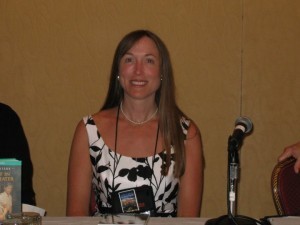
Kirkus Reviews interviewed me Tuesday for an author profile in the indie section they’ve got now. I had a nice talk with Sarah Rettger, who is writing the story.
One question flustered me, though, and usually does whenever I’m asked it. What type of promo has worked well for you? I answered, as I always do, that I don’t actually really promote. I do build up my name as a platform online (Twitter, blogging), but that’s mostly to increase my profile in Google rankings so that readers can easily find me. This strategy appears to work since readers seem to have no trouble finding me.
My lack of promo is something that I’ve always felt guilty about, though, especially for my Penguin books. I feel, there, as if I’m letting an entire team down by not promoting. I don’t feel that way for my self-published books because no one is making profit on my sales except me…and whatever retailer sold the book.
I’ve been encouraged in the past by Penguin to do some small-scale promoting. I suspect that they’re baffled by my platform, which is clearly writer-centric. As I’ve mentioned before, I’m not marketing to writers…I’m connecting with them. But it makes things difficult when Penguin does ask me to do a bit of promo—a tweet, for instance, for a giveaway they’re doing for one of my releases. I’ll do it when asked…but I’m tweeting writers. You know? It doesn’t make sense to me. So what I’ve done is promote their giveaway on my Riley Adams Facebook profile instead. That’s a place where I’m mainly connected to readers. If they directly ask me to do something, I’ll try to figure out a way to do it (usually).

What I’ve done in the past as promo:
Radio interviews
Skype interviews
Podcasts
Blog tours
Reader conferences (I’m with my author friends at the circa 2010 Malice Conference in the photo above…and we did have fun. Always love spending time with writers.)
Guest posts on Penguin’s various blogs
Emails to extended friends and family (ugh)
Facebook updates
Goodreads giveaways
Bookmarks
Author panels at libraries and bookstores
Signings
Postcards to bookstores and libraries
The absolute worst…cold calls to bookstores
As a side note, I never paid for ads. Not in magazines, not on local radio, not on Facebook, not on Goodreads. I didn’t feel as if I was making enough to justify ads.
But I even, for my first Penguin release, went on a very centralized book tour with several other Penguin authors. I enjoyed being with the other writers…although public speaking and appearances are stressful for me and I was exhausted afterward. There was an additional problem, too—I guess some of us are just going to feel guilty no matter what, because while I was feeling good about the promo I was doing, I felt guilty about not being at home with my kids. Parents can’t win in the guilt department, of course.
And, y’all, this sort of promo is expensive. The tour, the conferences. I’m a midlist writer. I should have been writing.
And don’t think any of the promo really did any good. I haven’t noticed that sales have declined since I’ve stopped this stuff. And I have a lot more time to write and am a lot less stressed.
At some point I hit upon the perfect excuse. I frequently had three or four releases in a year…was I seriously going to do heavy promo for each launch? I figured that promoting that number of releases would irritate friends and family and spam readers and writers. If readers wanted to find out about releases, they could sign up for my newsletter or follow me on Facebook…I didn’t need to try to stick my new release in front of them. Besides, Amazon’s marvelous algorithm (however it works) always seems to kick in after a few days.
What I’m doing now:
Goodreads giveaways occasionally
Facebook announcement of releases
Updated website
Reader newsletter
Fussy Librarian
As for ads/paid promo, one exception is that I may consider BookBub soon since I’ve heard some good stuff about it (Joanna Penn’s piece from April of last year, for example).
The biggest thing that I do to promote is to write more books.
With my book releases for my publisher, I did feel pressure to promote in the first few weeks after the launch. That could be tough to do—especially if I was under deadline for another book at the time (which was frequently the case).
With the digital revolution, there’s now the so-called “long tail” of publishing. The important thing is to look at sales as something that take place for a long time…over the decades of our career. Writer Joanna Penn interviewed industry expert Jane Friedman and there’s a fascinating transcript of their conversation on Joanna’s post “Money, Writing And Life With Jane Friedman.” I’ve read the article several times over the past couple of weeks and found something different and interesting each time. Highly recommended for any career-minded author. Regarding the topic of promo, Joanna Penn stated: “…most books sell very few copies every day, whether you’re indie published or traditionally published, but hopefully that continues for a long time, that is the business model, small over time.” Jane Friedman responded: “Right, and I hope that traditional publishing gets away from this launch mentality. I think slowly we’re getting away from that. I think the independent authors have been so good at pointing out to the larger community, ‘Let’s not focus on the first three months or six months, because the real potential is over the career.’”
So this is where I am with the issue. Convinced enough that promo doesn’t help to avoid doing it…but still susceptible to guilt when asked about it!
How about you? What sort of promo have you done…and what were your thoughts on the outcome?
The post Walking Away from the Stress of the “Big Release” appeared first on Elizabeth Spann Craig.
May 25, 2014
Working a Paranormal Element into Mysteries
Guest Post by Marsali Taylor, @MarsaliTaylor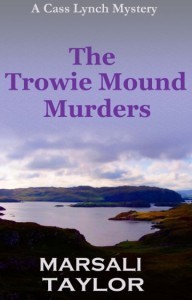
The world is a more interesting place than our science can explain.
I’ve always been at ease with the idea that the world is stranger and more interesting than our present scientific knowledge can account for. Maybe it’s because I’m Scots; one look at old ballads shows we’re a people used to second sight, omens, superstition, ghosts, devils and companies of the Elven folk. French friends assure me there are no fantomes in French castles, whereas no self-respecting Scottish castle would have fewer than three.
Maybe it’s my own family. My sister has a story of meeting a kilted man who seemed to vanish when she turned her back on him. My mother recalled my granny’s wheelie shopping bag falling from the back of a high shelf at the moment she had a heart attack in hospital; with my artist father, an easel which nobody was near fell over at the time his mother died. I vividly remember having an awful, choking cough one night, and being raised and given a soothing drink which took it completely away. When I bounced downstairs the next morning and asked, ‘What was that drink? It worked like magic!’ my parents stared at me blankly …
On top of that, I’ve subscribed to the wonderful magazine Fortean Times for over thirty years. I’m not sure the world is quite as odd as that, but I’m certainly prepared to be open-minded about the frequently-seen big cats in the British countryside, showers of frogs and sea-serpent sightings. I’m convinced we have a household boggart, and talk to him occasionally, though I’ve not gone so far as to leave milk for him.
Cass, my main character in my detective novels Death on a Longship and the newly-published The Trowie Mound Murders, is a liveaboard sailor with ten years experience of roaming the world’s oceans. In Death on a Longship she recalls having seen a ‘mer-horse, off Fiji, with a glistening neck and blind, saucer eyes’ and in the book currently being edited, A Handful of Ash, she remembers having seen a ghost ship, with ragged sails and dead men climbing the rigging. The sea is a good place for seeing strange things, especially from a silent sailing craft.
Cass grew up in Shetland, which is rich in traditional lore. Her friend Magnie, a retired whaling-man who taught her to sail, is full of good stories, or yarns. When two visitors spot a grassy mound which they think may be a Neolithic chambered cairn, Cass tells them that it’s known as a ‘trowie mound’ (the word trow comes from the Scandinavian troll), and urges Magnie to recount the story of the fiddler who was invited to play for a trowie wedding:
It was Magnie’s best story and he told it well, from the midsummer-eve opening by that green hillock, when a local fiddler was asked by a small, brightly clad man if he’d come and play at a wedding, through the description of the trowie celebrations to the man awakening by the knowe again, to find the landscape changed around him, old houses gone and new ones grown. ‘And he went back, that man, to his ain hoose, and the folk there stared at him, until the auld man by the fire minded tales o’ his own grandfather, who’d disappeared one night and never been seen again, and that was this very man.’
‘And what happened to him then?’ Sandra asked.
Magnie’s rare smile wrinkled up his weathered face. ‘You’re thinking he mebbe withered up in front of their eyes? Na, na. Well, they asked him to bide, he was their own kin, but he never settled. There was naebody he kent, you see. In the end he spent day after day ida kirkyard, joost lookin’ at the graves. Then, when midsummer came round again, he said he’d had enough. The trows would be glad o’ a good fiddler, he said, and midsummer eve they’d be out and about, if ever they were. He’d go up to the knowe and ask to be taken in. So that night up he went and that was the last they ever saw o’ him. But sometimes you’ll hear – and I’m heard it myself – you’ll hear a strain o’ fiddle music coming out of that very mound, or see lights moving around it, and I’m seen that too.’
Magnie’s story is a traditional one; I’ve had the very cottage pointed out to me. The moving lights he describes are a feature of my own village. They were at a house called Slyde, and I’ve been told they were common enough for folk to detour on the way home from a dance ‘to watch the Slyde lights.’
‘Just like people coming down the hill carrying a lantern,’ one person told me. ‘You’d see them from the other side of the voe, but the old man that lived there, he never saw them at all.’
Interestingly, our voe, or sea loch, is right on a fault line – we’ve even had an earth tremor here, centred just two miles from our house. I wonder if the Slyde lights were some form of piezo-electricity?
Another of Magnie’s tales that’s featured in The Trowie Mound Murders is a selkie (seal-human) story which gives Cass troubled dreams:
I’d dreamt last night about Magnie’s selkie wife, one of those dreams that left you with a sense of foreboding that clung like a dark mist for the rest of the day. I’d been that selkie wife, born a seal and delighting in the roughness of the waves, yet shedding my skin to be a woman on shore, and dance on human feet in the moonlight – until a young fisherman had hidden my skin and kept me for himself. In the dream, I’d loved him, and melted into his arms. I wasn’t going to give the face a name, not even to myself. But my selkie wife had grown gnawingly, achingly, heartsick for the sea, and I’d searched for my skin in the bare house with its driftwood furniture, in the cluttered byre under the old dogskin buoys and tangle of lines, until I’d become frantic, thinking he’d destroyed it, and I’d be trapped on this heavy land until I died of longing. I’d run into the sea, leaving my baby wailing in its cradle, and awoke gasping as my mouth filled with water –
I knew where the dream had come from. My friend Magnie had been telling ghost stories, and one of them had been of the wailing baby, the selkie wife’s deserted child, which had sickened and died without her. I knew why too. It wasn’t hard to analyse. After a dozen years at sea, as yacht skipper and dinghy instructor, I’d decided to go for a commercial qualification at the North Atlantic Fisheries College in Scalloway, Shetland’s ancient capital. … I was dreading it, a year of school, of being trapped day after day ashore, stuck in this northern climate, with no chance of tiers of white sails above my head, and the southern cross bright before the prow in the blue-black night. I was afraid that I wouldn’t be able to do it, that the call of the sea would be too strong…
Later in the story, Cass and her crew Anders hear the crying baby for themselves … and when one of her sailing pupils goes missing, Cass sets off to discover the secrets of the Trowie Mound.
It’s fun weaving another world into my stories. There’s a tradition in detective stories that the world has to be rational, and everything has to be explained in the last chapter; but I want to keep resisting that. The murderer is unmasked, of course, and the plot explained, but Cass still knows that she lives in a world which includes a mer-horse, off Fiji, with a glistening neck and blind, saucer eyes.
Death on a Longship and The Trowie Mound Murders are both published by Accent Press, and available from Amazon as book or e-book. Cass’s third adventure, A Handful of Ash, is set in the ‘witches’ town’ of Scalloway, and will be available as an e-book from July.
 Marsali Taylor grew up near Edinburgh, and came to Shetland as a newly-qualified teacher. She lives with her husband, five cats and two Shetland ponies on Shetland’s scenic west side. Marsali is a qualified STGA tourist-guide who is fascinated by history, and has published plays in Shetland’s distinctive dialect, as well as a history of women’s suffrage in Shetland. She’s also a keen sailor who enjoys exploring in her own 8m yacht, and an active member of her local drama group.
Marsali Taylor grew up near Edinburgh, and came to Shetland as a newly-qualified teacher. She lives with her husband, five cats and two Shetland ponies on Shetland’s scenic west side. Marsali is a qualified STGA tourist-guide who is fascinated by history, and has published plays in Shetland’s distinctive dialect, as well as a history of women’s suffrage in Shetland. She’s also a keen sailor who enjoys exploring in her own 8m yacht, and an active member of her local drama group.
The post Working a Paranormal Element into Mysteries appeared first on Elizabeth Spann Craig.
May 24, 2014
Twitterific Writing Links
by Elizabeth S. Craig, @elizabethscraig
Twitterific links are fed into the Writer’s Knowledge Base search engine (developed by writer and software engineer Mike Fleming) which has over 23,000 free articles on writing related topics. It’s the search engine for writers.
How to Know If You’re Editing Too Soon: http://ow.ly/wXLkF @losapala
Promoting Your New Book with Promo Websites: http://ow.ly/x8p9v @silas_payton
“Don’t Let Your Hurt Stop You” : http://ow.ly/wXLXz @PiaPadukone @writersdigest
17 Lost Manuscripts: L. Frank Baum, Ernest Hemingway, John Milton, and More: http://ow.ly/wXL3c @BookishHQ
How To Think Like A Writer: http://ow.ly/wXLoI @carolyn_greg
How to Break Out of the Slump and Finish Your Book: http://ow.ly/wXKZb @shaynakrish
10 Quotes to Inspire Writers: http://ow.ly/wXLbO @bethvogt
Tips for making your books discoverable: http://ow.ly/x6N03 @jakonrath
The Value of Editing For Authors: http://ow.ly/x5QS6 @BryanThomasS
Do Negative Thoughts Give You Writer’s Block? 5 Ways To Cut Loose: http://ow.ly/wSx19 @writetodone
Kindle Publishing: A Step-by-Step Guide for Selling Your Book Through Amazon: http://ow.ly/wSxDh @Heathervdh @alexisgrant
How To Break Up With Your First Draft: http://ow.ly/wSyt4 @chrstnejschmdt
Series Readers€”What they Really Want to See in Our Books: http://ow.ly/x6P0e
Crafting Memorable Characters: http://ow.ly/wSB10 @QLindseyBarrett @Missouri_Review
4 Danger Signs To Search For, Before Sending Off Your Novel: http://ow.ly/wSvFN @charliejane @io9
Feed the reader inside the writer: http://ow.ly/wSAtc @noveleditor
‘Creative Ideas Aren’t Enough: —You Need the Courage to Act On Them.’ http://ow.ly/wSzc9
How Thinking Like Johnny Depp Can Help Your Writing: http://ow.ly/wSyUj @WriteToSell
The Focus Drought and How to Get Your Focus Back: http://ow.ly/wSwy4 @missafayres
Simon & Schuster Embraces E-Book Subscriptions: http://ow.ly/x6MhA @mashable @sfiegerman
All Character, No Plot: http://ow.ly/wSxUW @mooderino
Search Engine Ranking- The Value of Social and Search: http://ow.ly/wSyH2 @jim_devitt
Initiative to get indie books into libraries + new author earnings info: chat at #EtherIssue: 11 am ET/4 pm BST (now) with @Porter_Anderson
The Accomplished Creative’s Afflictions: http://ow.ly/wSxeZ @JeffreyDavis108
Tips for writing epilogues: http://ow.ly/x0WmV (from the Clever Girl Helps blog):
When police must dig into flawed investigations in crime fiction: http://ow.ly/x5Wag @mkinberg
Writing lessons learned from Divergent: http://ow.ly/x5QIu @JulieMusil
7 secrets about editors every freelance writer should know: http://ow.ly/wFavA @michellerafter
Tips for Writing a Fiction Series: Developing Spin-Offs and Sequels: http://ow.ly/wF8WJ @AdriennedeWolfe
4 Ways Fictional Romance Sometimes Reads False: http://ow.ly/wQRCY @vgrefer
What Scandal Can Teach Us About Plotting and Tension: http://ow.ly/wF860 @Janice_Hardy
4 Reasons Why Your Hero Needs A Special Skill or Talent: http://ow.ly/wQRIM @angelaackerman
University Presses Under Fire: http://ow.ly/wQV7A @TheNation @scottesherman
6 Things Every Hero Needs: http://ow.ly/wQQkr @bang2write
How a writer’s name can make or break the popularity of their work: http://ow.ly/wQPH3 @NewStatesman @ofarry
Self-Published eBook Authors May Out-Earn The Rest By 27%: http://ow.ly/x4C39 @HughHowey @Porter_Anderson
A response to the statement: ‘The novel is dead.’: http://ow.ly/wQRW5 @acrossthemargin
An agent answers query questions: http://ow.ly/wQVxB @MsMariaVicente
Tips for marketing on Amazon: http://ow.ly/wQUUn @noahkagan
How to create the perfect trailer (for films–useful for books as well): http://ow.ly/wQVlw @creativebloq
The Whys, Whens, and What-Nots for Opening a Story: http://ow.ly/wQPoL @jodyhedlund
3 Things to Know About Exposition & Telling: http://ow.ly/wQVJK @victoriamixon
Initiative to get indie books into libraries + new author earnings info: http://ow.ly/x3amb @HughHowey @Porter_Anderson @cjlyonswriter
How to self-publish a print book, worldwide: http://ow.ly/wQPle @Belinda_Pollard
Is there a “best day” to buy books, or promote books, in the Kindle Store? http://ow.ly/wQQv2 @BookGorilla
May 2014 Author Earnings Report: http://ow.ly/x38ec @authorearnings @HughHowey
Tips for New Authors (Finishing Your First Book): http://ow.ly/wQRfD @AOwenBooks
7 Writing Lessons Straight From Jennifer Weiner’s Mouth : http://ow.ly/x2Y3h @galitbreen
Write It : Don’t Fight It! (The answer to: Are you a writer?) http://ow.ly/wQRwY @adderworld
The New Golden Age of Short Fiction: 12 Reasons to Write a Short Story This Month: http://ow.ly/wQSzo @annerallen
The No-Stress Way To Create Your Story’s Logline: http://ow.ly/x00qW @PBRWriter
3 Tactics to Stop Letting Inspiration Rule You: http://ow.ly/wNKum @EmilyWenstrom
3 Ways Nonfiction Can Be the Fiction Writer’s Greatest Resource: http://ow.ly/wNM3h @livewritethrive
The Story of Story: How 1 Writer Learned to Stop Worrying & Love Structure: http://ow.ly/wNQdK @justinismorrow
5 Ways to Create Conflict in Your Story: http://ow.ly/wO0dI @screencrafting
Agents – the Good, the Bad and the Ugly: http://ow.ly/wNOad @ClareLangleyH
Storytelling Strategies: When In Trouble, Reach for the Deadline: http://ow.ly/wNR8O @scriptmag
Top 10 tips for being a literary agent: http://ow.ly/wNZHr @JonnyGeller
The 5 Essential Story Ingredients: http://ow.ly/wO0p8 @writersdigest
If You Don’t Write That Book, Who Will? Deciding What to Write: http://ow.ly/wNQTI @JanetKGrant
A Balance of Strengths to Take Your Story Higher: http://ow.ly/wNMXm @writingeekery
3 Tips for developing theme: http://ow.ly/x0Vjb (by Jack Smith)
Fantasy and How the World Ought To Be: http://ow.ly/wNNei @mythcreants
Advertising on Goodreads: http://ow.ly/wNL4g @AuthorMelindaC
Sympathy for a Good Villain: http://ow.ly/wO0NL @DrewChial
Our Young-Adult Dystopia: http://ow.ly/wNOij @michelledean
Planning Your Novel with Google Maps: http://ow.ly/wZZSk @ClarissaDraper
How James Patterson Works With His Co-Authors: http://ow.ly/wNZZA @woodwardkaren
Persuasive charmers–a character type found in crime fiction: http://ow.ly/ @mkinberg
Screenwriting: The Bourne Identity’s Everyman that Isn’t: http://ow.ly/wNN4t @cockeyedcaravan
Writing Groups and How They Can Go Wrong: http://ow.ly/wYqeS @VictoriaAddis
Why no one is seeing what you post from your Facebook author page: http://ow.ly/wKsat @chrisrobley
The 10 Worst Pieces of Writing Advice You Will Ever Hear: http://ow.ly/wKsp5 @manzanitafire
Raising the Tension in a Flat Opening Scene http://ow.ly/wKtHZ @Janice_Hardy
The Thrill of the Write: http://ow.ly/wKtfj @wordsxo @writerunboxed
1 Writer’s 5 Favorite Pieces of Writing Advice: http://ow.ly/wKsIO @OakleyColleen @womenwriters
‘Trying’ to Self-Publish: http://ow.ly/wKr3g @hopeclark
Why Tumblr is Useful for Bloggers: http://ow.ly/wKsAJ @ava_jae
Time travel cliches: http://ow.ly/wKtBh
Why you & your art need a creative adventure: http://ow.ly/wKttc @FortheCreators
7 Book Marketing Strategies Guaranteed Not to Lead to Sales: http://ow.ly/wKtmJ @NathanielTower
Amazon Launches New Kindle Store Section Devoted to eBook Singles – Short Reads: http://ow.ly/x9xxf @thDigitalReader
Narrative Arc: Shaping Your Story: http://ow.ly/wXLiQ @fcmalby
Amazon’s Disappearing Reviews: http://ow.ly/wXLTi @kcrosswriting
Publishing is More than Books: http://ow.ly/wXLQB @HughHowey
Which Is More Important? Writing or What We Write? http://ow.ly/wXKPS @KMWeiland
3 things to know about out-of-print books. http://ow.ly/wXKVz @wweek
eBook Pricing: What’s Wrong with Free? http://ow.ly/wXLe3 @lorcadamon
A new-old Amazon scam for the unwary reader: | Indies Unlimited: http://ow.ly/wXLhw
How to Write More: http://ow.ly/wXKNh @writersdigest
Why ‘Game of Thrones’ Writer George R.R. Martin Uses an Old School DOS Machine: http://ow.ly/wXSVG @nofilmschool
Screenwriting for Readers vs. Audience: http://ow.ly/wXSWw @scriptmag @ruth_atkinson
Movie Scripts: 8 Animations Scripts For Screenwriters: http://ow.ly/wXSYC @goodinaroom
The Best Method to Break Writer’s Block: http://ow.ly/wXT1c @joebunting
What Is Your Story? http://ow.ly/wZ9o1 @jenlouden
Why 1 Writer Reads Reviews… Even the Soul-Crushing Ones: http://ow.ly/wZ9Mt @GwenHeasley @MartinaABoone
The Little Things Holding a Story Back: http://ow.ly/wZa1A @Janice_Hardy
Epilogue tips: http://ow.ly/wZ9Ee
How to really get readers to care about your characters: http://ow.ly/wZ9zL @onewildword
Not-So-Risky Business: Book Promotion on a Budget: http://ow.ly/wZ9Xe @TeeMonster
Taxes 101 for Authors: http://ow.ly/wZ9y1 @susanspann @rmfwriters
Portals in science-fiction: http://ow.ly/wZ9uS @victoriasicoe
Do You Know Your Novel’s Theme? http://ow.ly/wZa2r @Janice_Hardy
Writing and the Creative Life: Boundaries of Space, Boundaries of Time: http://ow.ly/wZ9AK @gointothestory
10 Steps To The Best Cover For Your Book: http://ow.ly/wZ9Cq @Mal_Rock
The difference between a commercial and a literary plot: http://ow.ly/wZ9wK @writers_write
Jot Down Writing Ideas With Six Word’s: New iPhone App: http://ow.ly/x0RV4 @galleycat
The Complete Guide to Self-Publishing a Book that Doesn’t Suck: http://ow.ly/x0NQj @brandonclements
5 Tips for Setting Up a Writing Space: http://ow.ly/x0Pvp @StacyEnnis
Killing the Top Ten Sacred Cows of Indie Publishing… #4: You Need An Agent to Sell Overseas: http://ow.ly/x0OpJ @deanwesleysmith
Evernote’s Moleskin: Analog to Digital Notebook with Plenty of Space for Play: http://ow.ly/x0QHb @appnewser
Great Character: Sam Shakusky (“Moonrise Kingdom”): http://ow.ly/x0QWN @A2Jason
13 steps to creating a writing-centered life: http://ow.ly/x0S9i @collectiveself
Romance Writing: 6 Types of Alpha Heroes: http://ow.ly/x0Q1L @JackieAshenden
The 7 habits of highly effective writers: http://ow.ly/x0O8e @pubcoach
Gimbling in the Wabe – Why Do People Read Bad Books? http://ow.ly/x0R9T @LitStack
Psych for Writers: Emotional Scenes and Unreliable Narrators: http://ow.ly/x0PIM @SkyeFairwin
How To Market Your Book To The Locals – 4 Secrets: http://ow.ly/x0Qu3 @KristenEckstein
How to Charm the Pants Off an Editor with the Power of Your Words: http://ow.ly/x0QmL @pshares
The Amateur’s Guide a Professional Book Package: http://ow.ly/x0S0p @DIYMFA
5 Tips To Edit Your Own Screenplay: http://ow.ly/x0P8W @bang2write
Nonfiction: how to plan and outline your book before writing the first word: http://ow.ly/x0Rn8 @NinaAmir
How to save a bundle on editing costs…without sacrificing quality: http://ow.ly/x2Xu3 @jodierennered
How James Patterson Works With His Co-Authors: http://ow.ly/x2XJ4 @woodwardkaren
On Quitting Writing: ‘I Can’t Go On. I’ll Go On.’ http://ow.ly/x37B5 @TheReviewReview
How to Get Boys to Read Books | Children’s Literacy Foundation: http://ow.ly/x37tL @cliforg
How to Hack the Habit of Creativity http://ow.ly/x37ay @mythicscribes
10 Things That Make A Reader Cringe: http://ow.ly/x2XbO @dmoncrief0131
Self-publishing will save literary fiction: http://ow.ly/x37wb @HughHowey
The post Twitterific Writing Links appeared first on Elizabeth Spann Craig.
May 22, 2014
The Power of Covers
By Elizabeth S. Craig, @elizabethscraig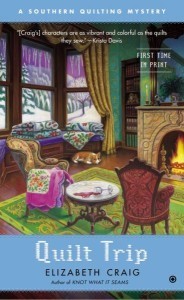
I think by now most of us have agreed that, whether they should or not, covers have a tremendous impact on what readers purchase.
In a split second, a good cover indicates a book’s genre. This is probably the most important role of a cover, in commercial fiction.
As Mark Coker of Smashwords states in his free ebook, The Secrets to Ebook Publishing Success:
Your cover is the first impression you make on a prospective reader. It’s the visual embodiment of everything your book represents. Great covers, through their imagery alone, can communicate genre, topic, mood and setting. A great cover image makes a promise to prospective readers. It helps them recognize your book as one they’ll enjoy reading.
I actually received an email from a reader recently. She’s an avid reader of the Myrtle books and also enjoys the Southern Quilting mysteries. She hadn’t, oddly to me, ever commented on my Memphis Barbeque books (and I knew that she was aware that I write that series under a pseudonym). She told me in her email that the Memphis books looked very “serious” and she’s a fan of humorous mysteries. She decided to give them a go recently and told me “I guess you can’t judge a book by its cover” since she’d enjoyed the books and found them the humorous/bordering-on-campy reads that I usually create.
In her email, she particularly referenced this Memphis cover as one that had given her pause:
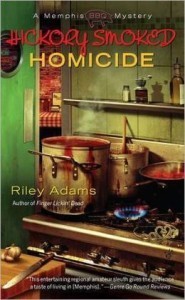
I had a conversation in the comments with writer Meg Wolfe last week about tone in our books. I mentioned that the title above, Hickory Smoked Homicide, had had a darker tone to it—because I was in a dark mood, for some reason. I had nothing going on in my life to justify the dark mood, except the fact that this book was incredibly difficult for me to write and I think the struggle, weirdly, came out in the tone. This was the book that I nearly deleted several weeks before deadline out of complete frustration. Then I had an epiphany after speaking with a friend who had grown up in the culture I was writing about, and the book ended up working out really well.
But! The cover designer at Penguin totally picked up on the tone and you can see it in the cover. It did scare away some cozy readers of mine, I’m sure. But I ended up receiving more emails from male readers than I ever had. So maybe it ended up working out for me in the end.
I definitely have a particular feel in mind when I’m contracting a cover for my self-published books. This is a cover that I got back on Wednesday from my current cover designer, Karri Klawiter for a book that will come out this fall (yes, I’ve found it smart now to go ahead and get covers for books that I haven’t even finished writing yet):
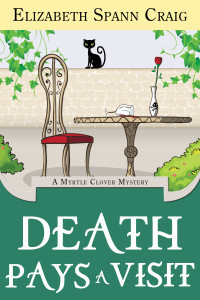
To me, this is the kind of cover that clearly indicates a light mystery.
We know it’s important, but how do we connect with a good cover designer if we’re self-published authors? Well…it does take a little research. Most authors are great about sharing on their blogs who did their covers—considered a nice plug for the designer they worked with. So, if you browse your genre on Amazon, paying special attention to the lower-priced books (because, the way the current climate is, those are still more-likely to be self-published books), make note of the book titles that reflect the cover look you’re going for. Then you can click on the author’s Amazon Author Central page, which ordinarily connects to a blog. Then you can search the blog for keywords like “cover designer.”
I also maintain a free spreadsheet of ebook professionals, which include cover designers.
So, these are my observations from a non-designer side of the business. What observations have you made about your own covers and what works?
The post The Power of Covers appeared first on Elizabeth Spann Craig.
May 20, 2014
Series Readers—What they Really Want to See in Our Books
by Elizabeth S. Craig, @elizabethscraig
I’ve just finished the latest Southern quilting mystery—book five in that series, due to release in late 2015. So that means, right now, I’m no longer under a contract until Penguin decides if they’d like to acquire more books for the series (likely something they would determine after seeing sales figures for book four, coming out in August).
For the first time…ever, really…the only project I have to work on is my self-published Myrtle Clover series. I started book seven at my usual full throttle, and then slowed my writing pace down a bit and decided to take a more thoughtful approach.
I have a completed outline for the book. The mystery looks pretty sound. Readers told me they especially wanted more humor and the book’s outline has plenty included.
But then I remembered some of the other emails I’ve gotten. Readers have been writing me and mentioning things they’d like to see in my Myrtle stories. Others wrote that they were “so glad to hear more about____”. I remember reading these emails and being baffled because the elements the readers liked and wanted to hear more about seemed very incidental to the story.
But I know by now that anything readers like, even if it seems incidental to me, is simply a sign that I’m not getting it.
I started looking more closely at those elements and what I saw was that they were interested in seeing more glimpses of what everyday life is like for my recurring series characters…when they’re not solving a mystery.
Someone mentioned wanting to find out if Myrtle’s sidekick, Miles, had children and grandchildren and what they were like.
Someone else wanted to know where the yard gnomes all came from and how long Myrtle had been collecting them.
The things they’d mentioned fell into a couple of groups—information that I identified as background info that’s up in my head but never written about, and information that I had honestly never even considered.
What’s curious to me is that there is so many articles out there warning against extraneous detail and how readers don’t want it cluttering up a story. That’s one of the main writing “rules” that we all read about over and over again—dump the backstory.
So I’m wondering if there’s a point in a series where readers suddenly are really very interested in this extraneous backstory. Because it still has no bearing on the mystery or subplots. And, unless I work it very carefully into a story, it still would resemble an info-dump.
What I’d rather do is to work a story around some of this information that readers have become curious about and make them either important to the mystery or important to the characters’ general personality—have it be something that either gives the readers some insight as to how they ended up being the way they are or show more about them as they are now. Maybe I could even pull some of the info into a subplot—extra points if I can connect the subplot to the main plot.
I do enjoy glimpses in characters’ pasts in other long-running series. Elizabeth George has done a nice job showing us working class cop Barbara Havers’s background and how her background is now impacting her present.
What I did was make a Word document with a list of questions. The questions were both what I thought readers might be interested in knowing and what they had already indicated to me that they’d like to find out. They included everything from the unnamed street where much of the action in the stories takes place to what book literature-loving Myrtle is currently reading.
I’ll set about incorporating some of them into this story, some of them into upcoming stories. I’ll try to make the information significant, too, because there may be some new readers happening into the series for the first time.
As a reader, is there a point when you start becoming interested in extraneous detail? As a writer, when have you started adding some of this backstory into your series?
Image: MorgueFile: ARTG33K74
The post Series Readers—What they Really Want to See in Our Books appeared first on Elizabeth Spann Craig.
May 18, 2014
Developing Thematic Ideas in Your Fiction
Guest Post by Jack Smith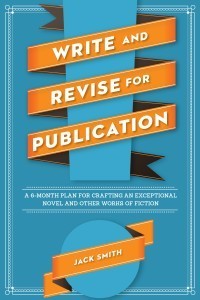
I tend to like fiction that can be read on several different levels. It’s not just a good story; it also points to abstract ideas of various kinds—to themes beyond the literal level of character and plot. Perhaps it suggests something about the nature of evil, about personal identity, or about the nature of freedom. How heavy should the machinery of idea be? Naturally, this depends on what your purpose is and who your audience is. I won’t take that question on here, but I will say that there are several thematic techniques that can work seamlessly with story. You don’t have to trowel on ideas like icing on the cake.
What are these techniques? I’ll deal with three.
Repetition. When a given word, thing or place, or action is repeated several times, it can begin to mean more than what it would mean if it occurred just once. For instance, if the story has to do with freedom from different types of oppressive situations or environments, and if the word “cramped” is used in several different contexts, the reader may get an existential sense for the various ways humans can be cramped. Perhaps your character feels cramped in her small house; perhaps her menial job cramps her; perhaps she feels cramped in her marriage. And then perhaps synonyms of the word cramped can be introduced: “hampered,” “hindered,” “impeded.” The cluster of words centered around this idea of being cramped can help illuminate the various kinds of threats to human freedom—and the nature of freedom itself. It’s possible to find ways to thread your story or novel with the ideas suggested by a given key word.
If a particular thing, or place, is mentioned repeatedly, it can also take on meanings beyond its literal existence. For instance, if your protagonist’s house has a view of the mountains, and your protagonist is often at her window looking out at it, this might suggest a desire to break free from life’s ordinary, mundane restraints and embrace the wildness and freedom of nature. What are the various properties of nature that suggest this freedom? The mountain could become symbolic of all the qualities of freedom she seeks, whether she can obtain this kind of freedom or not.
An incident, if it is repeated several times, can also take on larger meanings beyond the literal. If the protagonist’s husband is always leaving the house to go to his high- powered job, and the protagonist feels stuck there with little future ahead of her, then this constant exiting of the husband can take on larger meanings. It might suggest different societal spheres for men and women: the opening of opportunities for men in career fields (as the husband steps outside) and the closing off of opportunities for women (as the door shuts each time on the wife).
Development of key events with suggestive imagery. Imagine that your protagonist undergoes a sudden illness. If you provide enough suggestive details, you can point to an idea at a more abstract level—perhaps the fragile nature of human existence. Your story isn’t just about this one sick person with this sudden illness; it’s also about human vulnerability period, the tenuous nature of human existence—or rather it can be. Through apt metaphors—comparing the illness to falling in a manhole, having a plane crash on one’s house, being hit by a stray bullet—the reader will begin to see your story at a more general level: how humans can suddenly be struck down with no apparent defense.
Key passage. Sometimes character thought or reflection can suggest a larger frame of reference, especially if the language is metaphorical. Imagine that your protagonist is a vulture capitalist—already a metaphor. He thinks to himself: “I’m the spider and they’re the fly. It’s a matter of sucking them dry.” With this image and others, one might get at the very essence of vulture capitalism—beyond the surface-level story of the machinations of a particular vulture capitalist.
A work of fiction that takes on multiple meanings is, to me, more interesting than one that has only a character and a storyline. I want to think beyond these to larger implications. A story has to work as a story first, though, with a strong character and an interesting character arc. But look for ways to raise your short story or novel to levels beyond the literal. Don’t force it, but when you see opportunities, take advantage.
Jack Smith is author of the novel Hog to Hog, which won the George Garrett Fiction Prize (Texas Review Press. 2008), and is also the author of Write and Revise for Publication: A 6-Month Plan for Crafting an Exceptional Novel and Other Works of Fiction, published earlier this year by Writer’s Digest. His novel ICON will be published in June by Serving House Books.
Prize (Texas Review Press. 2008), and is also the author of Write and Revise for Publication: A 6-Month Plan for Crafting an Exceptional Novel and Other Works of Fiction, published earlier this year by Writer’s Digest. His novel ICON will be published in June by Serving House Books.
Over the years, Smith’s short stories have appeared in North American Review, Night Train, Texas Review, and Southern Review, to name a few. He has also written some 20 articles for Novel & Short Story Writer’s Market, as well as a dozen or so pieces for The Writer. He has published reviews in numerous literary journals, including Ploughshares, Georgia Review, Missouri Review, Prairie Schooner, American Review, Mid-American Review, and the Iowa Review.
The post Developing Thematic Ideas in Your Fiction appeared first on Elizabeth Spann Craig.
May 17, 2014
Twitterific Writing Links
by Elizabeth S. Craig, @elizabethscraig
Twitterific links are fed into the Writer’s Knowledge Base search engine (developed by writer and software engineer Mike Fleming) which has over 23,000 free articles on writing related topics. It’s the search engine for writers.
Write Down Your Dreams to Release Creative Blocks: http://ow.ly/wIm5r @losapala
How Stress Assassinates Creativity: http://ow.ly/wIma5 @_RobbieBlair_
An Author’s Perspective on the Hachette-Amazon Battle: http://ow.ly/wXLIh @author_sullivan
Could The Term “Women’s Fiction” Be Bad For Authors? http://ow.ly/wXUYx @randysusanmeyer @Porter_Anderson
Do Big Publishers Make Sense Anymore? http://ow.ly/wIl9C @ShariJStauch
A YouTube channel focused on topics for writers: http://ow.ly/wU1O9
How to write an author bio that sells books: http://ow.ly/wWHUn @zackheim
Different ways to end scenes: http://ow.ly/wKrw5
Why a Writing Routine Matters and How to Start One: http://ow.ly/wKrqo @stacyennis
Putting yourself into your writing (techniques for memoir, non-fic, and more): http://ow.ly/wKrWW @Belinda_Pollard
How to be sure you’ve got a compelling plot: http://ow.ly/wKtOI
Screenwriting: 6 Reasons Dialogue Is Your Enemy: http://ow.ly/wKsYh @bang2write
5 Tips for Writing Historical Fiction: http://ow.ly/wKrCn @writersdigest
A refresher: how to use quotation marks with punctuation: http://ow.ly/wKsRh @writers_write
Character Skills and Talents: Survival Skills: http://ow.ly/wKt92 @angelaackerman
7 Book Marketing Strategies Guaranteed Not to Lead to Sales: http://ow.ly/wKtmJ @NathanielTower
Can a Small Press Book Get a New Life with a Big Publisher? http://ow.ly/wImdo @Dear_Editor
Historical Fiction: 3 Tips for Leaving the Slush Pile Behind: http://ow.ly/wIlnm @tweetonsisters
Characters Under Stress: http://ow.ly/wIl60 @hayleymckenzie1
All about ‘high concept’: http://ow.ly/wIlVl @beccaquibbles
The New Golden Age of Short Fiction: 12 Reasons to Write a Short Story This Month: http://ow.ly/wQSzo @Anne R. Allen
Getting Our Work Out There (A Look at Wattpad): http://ow.ly/wXHx6
Email List Building: Create a Sign Up Incentive: http://ow.ly/wIm7E @writerplatform
For Those Considering Self-Publishing: http://ow.ly/wImgJ @RateYourStory @koryshrum
The Art of the Done List: Harnessing the Power of Progress: http://ow.ly/wIl27 @99u
What Makes a Media Release Effective? http://ow.ly/wIlka @LisaHallWilson
Killing the Top 10 Sacred Cows of Indie Publishing: No One Buys New Writers: http://ow.ly/wImsP @deanwesleysmith
The Importance of Letting ‘Em See You Sweat http://ow.ly/wIjqw @LisaCron
What Poets Know That Most Writers Don’t: http://ow.ly/wImnn @schwamb
The 5 Biggest Risks 1 Author has Taken: http://ow.ly/wIm31 @BadRedheadMedia
Digital first publishing and the troubled fortunes of digital first publishers: http://ow.ly/wT7WU @dearauthor
10 Tips for Writing Children and a Descriptive List: http://ow.ly/wHCaL @SharlaWrites
3 Reasons Why We Can’t Afford Not to Go to Writing Conferences: http://ow.ly/wHCdV @magdalenaball
Why You Need an Editor (And How to Save Money Finding One): http://ow.ly/wHBTq @sabsk
Choose the best genre for your book on Amazon: http://ow.ly/wWHuA @zackheim
How clichés and jargon can ruin your writing: http://ow.ly/wHC0d @AnthonyEhlers
New Author? Simple Steps to Success: http://ow.ly/wHBUA @christinenolfi
Straying from the Party Line: The Bourne Identity: http://ow.ly/wHBYH @cockeyedcaravan
How Much Time Book-to-TV Adaptations Get Out of a Page: http://ow.ly/wHBSo @galleycat
Showing through Point of View: http://ow.ly/wHC8F @fictorians
Writing For Good: http://ow.ly/wHC6h @randysusanmeyer @btmargins
Why Your First Draft Isn’t Crap: http://ow.ly/wHBWO @Adderworld
Positive and Negative Goals for Protagonists: http://ow.ly/wHC3S @jennycrusie
3 Tips for a Happy Author-Publisher Relationship: http://ow.ly/wF6xj @marygkeeley
The Absolutely True Diary of a Socially Challenged Author: http://ow.ly/wF5oQ @gripemaster
Hemingway’s 7 Fiction Writing Tips: http://ow.ly/wF6al @Danesh
When an agent relationship isn’t working: http://ow.ly/wF629 @janelebak
Why Writers Should be on Twitter and How to Get There: http://ow.ly/wF5x6 @gretaboris @LitCentralOC
When Should We Skip a Scene in Our Story? http://ow.ly/wF6Gg @jamigold
How to Value your Writing: http://ow.ly/wF6CY
Twitter Mute is a Savior from Spamming Indie Authors: http://ow.ly/wShzl @Goodereader
Making it as a writer–safe accountability– http://ow.ly/wF7L8 @jennaavery
A writer’s thoughts on NA: http://ow.ly/wF9Ea @MissDahlELama
5 Ways to Create Conflict in Your Story: http://ow.ly/wO0dI (from ScreenCraft):
How to promote your book on Amazon: http://ow.ly/wF8Np @wileyexchanges
Fictional Reality: http://ow.ly/wF9NB @biljanalikic
Will printed books outlast printed money, or football? http://ow.ly/wT8a0 @MikeShatzkin
Executing story turning points: http://ow.ly/wF9Y7 @medkno
I Finished My Novel……Now What? http://ow.ly/wF77w @growwithstacy
The Editorial Process: http://ow.ly/wF80I @rachellegardner
Keeping it simple: On plain language: http://ow.ly/wF700 @niemanstory
How to Write a Stupid Character: http://ow.ly/wF8Dp @KMWeiland
A recap of @Janefriedman ‘s keynote address from the PubSmart Con: http://ow.ly/wF8qG @K8Tilton @MartinaABoone
Carpe Diem–Create Something: http://ow.ly/wF7lH @ChuckWendig {lang}
Stock photos that don’t suck: http://ow.ly/wSzz3 @dustin
What Happened to the Harlequin Romance? http://ow.ly/wFae4 @newyorker @AdrienneRaphel
Novel Writing and Themes: http://ow.ly/wF9ql @EMCastellan
Poets and Poems: Robert Frost, Wendell Berry, and the Woods: http://ow.ly/wSg5q @gyoung9751
Series: Keeping Things Fresh Without Alarming Readers: http://ow.ly/wQA34
Plotting, Pacing, and Crossing Over: http://ow.ly/wzF7R @AnneGBrown @writerunboxed
A Synopsis Checklist: http://ow.ly/wCdDB
How to Write Your Story in 6 Steps: http://ow.ly/wCefM @ClaireJDeBoer
3 Steps to Choosing The Perfect Freelance Editor: http://ow.ly/wzGAO @ebooksandkids
What is writer’s block secretly telling you? Wit and wisdom from bestselling author @JamieFord: http://ow.ly/wRacA @JulieMusil
Self-Publishing #Fails : http://ow.ly/wChlt @JFBookman
How to Boost Creativity with an Idea Log: http://ow.ly/wzFFE @CherylRWrites
Isaac Asimov on Lifelong Learning, Science vs. Religion, and the Role of SF in Advancing Society: http://ow.ly/wzHnl @brainpicker
Promo and Marketing Materials that Work: http://ow.ly/wCdve @erin_bowman
Skimming: Never a Good Thing: http://ow.ly/wCfFt @FaeRowen
Writing a book using 15 minute increments: http://ow.ly/wzFyR @BookEmDonna
Amazon and Hachette Go to War: http://ow.ly/wPF0Y @HughHowey
Story and the Dimensions of Character: http://ow.ly/wzFdI @shalvatzis
Publisher-retailer conflicts are affecting readers. Chat on #EtherIssue at 11 ET, 4 p.m. BST (Now) with @Porter_Anderson
Tips for creating a fictional American town: http://ow.ly/wzGrf
Be Specific When Writing Reviews: http://ow.ly/wCgAE @JeriWB
Will publishers still be around in 10 years time? Actions to embrace: http://ow.ly/wPuYG @Porter_Anderson @fakebaldur @brianoleary
Your Character’’s Flaw is His Greatest Strength: http://ow.ly/wzIjM @monicamclark
What Type of Editor Does My Manuscript Need? http://ow.ly/wChpp @WriterlyTweets
Why We Should Read Poetry: http://ow.ly/wCdqT @AnnieNeugebauer
Realistic vs. Logic: http://ow.ly/wzH5V @CharleeVale
Money, Writing And Life: http://ow.ly/wQMBo from @JaneFriedman and @TheCreativePenn
Money, Writing And Life: http://ow.ly/wQMBo from @JaneFriedman and @TheCreativePenn
Traditional Publishing or Indie Publishing? http://ow.ly/wCeqH @LynnetteLabelle
How To Spot A Fake Amazon Review: http://ow.ly/wCdXO
Writing in more than one genre: http://ow.ly/wzGf6 @scottthewriter
Writing Romantic Suspense that Sizzles: http://ow.ly/wzFRe
Writing Around The Day Job: http://ow.ly/wChct @rosieclaverton
The Secret Sauce for Indie Publishers: Attitude: http://ow.ly/wCeaQ @ninaamir
Themes to Explore in Your Writing: Strength: http://ow.ly/wChfd @birgitte_rasine
5 Tips for Running a Writers’ Circle: http://ow.ly/wzFiL @standoutbooks @btmargins
When Retailers & Publishers Collide: Who Gets Hurt? http://ow.ly/wNyue @Porter_Anderson @victoriastrauss
Simple techniques to survive in the screenwriting trenches: | My Blank Page http://ow.ly/wzEXp
Should You Read About Writing? http://ow.ly/wzHvl @jaelmchenry @writerunboxed
Killing off favorite characters… can we do it? Should we?? http://ow.ly/wzItx @JungleReds
Finish that Draft of Your Story Now: http://ow.ly/wCgoK @plotwhisperer
Stephen King: How I wrote Carrie: http://ow.ly/wCdie @guardianbooks
Why Write fiction? The Page versus the Screen: http://ow.ly/wzHel @CSLakin
Review: PDF to InDesign Conversion Software for Book Layout: http://ow.ly/wzGiF @JFBookman
Publishers and Games Developers Face Culture Clash: http://ow.ly/wL8vr @MarkPiesing
Publishing’s Metamorphoses: Recap of Berlin Forum: http://ow.ly/wL0j5 @Porter_Anderson @HughHowey
The Ultimate Story Checklist using The Bourne Identity: http://ow.ly/wxPXd @cockeyedcaravan
10 Great Authors Who Disowned Their Own Books: http://ow.ly/wxQvH @io9
A writer reports in on his first Kickstarter effort: http://ow.ly/wxNPI
4 Pieces of Facebook Advice You Can Ignore: http://ow.ly/wxRHi @lisahallwilson
Targeting Your Readers One Headshot at a Time: http://ow.ly/wl71m @givemeyourteeth
3 surprising facts about self-publishing: http://ow.ly/wl7iA @Belinda_Pollard
Sometimes – It’s Who You Know: http://ow.ly/wmHyw @rachellegardner
The Unsung Benefits of an English Degree: http://ow.ly/wl8WE @bookriot
Confessions of a Failed Writer: http://ow.ly/wmGO2 @0jnolan
Choosing Your Screenplay Genre: http://ow.ly/wmGQ3 @screencrafting
What is the Future of Bookstores? 13 Divergent Views from Publishing Insiders: http://ow.ly/wmGYk @CarmenConnects
7 Tips for Making Stories Into Roleplaying Campaigns: http://ow.ly/wxPho
Paranormal or literary? Which age group is the book for? How to categorise your novel: http://ow.ly/wxOAY @roz_morris
Turn Your Main Character’s World Upside Down: http://ow.ly/wxOK7 @joanyedwards
The police procedural subgenre: http://ow.ly/wJOxO @mkinberg
Is Honesty the Most Important Trait in a Likable Character? http://ow.ly/wxQ9I @KMWeiland
11 Inspiring Quotes from the World’s Best Writers: http://ow.ly/wxQoC @LauraPepWu
The importance of a professional email address: http://ow.ly/wxRmy
Do You Write by Heart or Head? Technique Overload: http://ow.ly/wxNLs @cateartios
Transitioning from Fiction to Nonfiction: 4 Easy Steps: http://ow.ly/wK1Uj @NinaAmir
An easy way to make your plot plausible : control your novel’s timeline: http://ow.ly/wxOoV @roz_morris
3 Ways Creative Writing Shakes Your Complacency: http://ow.ly/wxQH3 @vgrefer
Words describing tastes of foods: http://ow.ly/wxLlb
News of and reaction to a publishing hackathon: http://ow.ly/wKRsk @philipdsjones @Porter_Anderson
30 Ways to Promote Blog Posts: http://ow.ly/wxP7C @writers_write
45 ways to avoid using the word ‘very’: http://ow.ly/wxPTV @writers_write
The post Twitterific Writing Links appeared first on Elizabeth Spann Craig.
May 15, 2014
Getting Our Work Out There (A Look at Wattpad)
By Elizabeth S. Craig, @elizabethscraig
Visibility and discoverability are words that I encounter time and time again on the industry blogs I follow. There are a lot of books in the marketplace right now. How can you make your book stand out…and find readers?
The best approach for obtaining visibility (in the current climate…things change rapidly) is to compose a lot of well-written books.
I’ve been pretty happy about my visibility on retail sites (90% Amazon, really), but I keep wondering how to reach more readers. I’ve got avid readers who I’m determined to keep happy. But how do I reach out to other demographics? Can I reach other demographics?
One publishing platform I’ve been hearing a lot about for the last year or so is Wattpad. There are authors I respect over there: Joanna Penn and Lindsay Buroker among them. They wrote glowing recommendations of the platform. As Joanna put it in her January post “How to Use Wattpad as an Author” : “How does Wattpad sell books? It’s about building a fan-base for your writing, as opposed to your tweets or blog posts.”
You’d think I’d have gotten on Wattpad much quicker than I did. I was even, for heaven’s sake, on a virtual panel with the Head of Content of Wattpad, Ashleigh Gardner, back in November for Dan Blank’s Get Read online conference. I was fascinated hearing her talk about the readers there: 25 million readers and growing. And another big number: 85% mobile (across all devices). In addition, it’s supposed to be a good way to gain international readers.
Wattpad is free to upload to and to read from. So this is for writers who maybe already have a perma-free book published or who want to hook readers with one.
I did have reservations about using Wattpad, which is why it has taken me so long to get on there:
1) It’s where the young people are. I have an older readership and my youngest protagonist is in her sixties. My oldest is in her mid-eighties. Wattpad has a lot of fan fiction and YA and I was worried I wouldn’t fit in.
2) I don’t want to write serials. I love the idea of writing serials, I love the way readers respond to serials…but I didn’t want to be on the hook for a serial while I’m under contract to Penguin-Random.
So…this was me basically just not understanding the platform.
Because you don’t have to upload the book as a serial…in the sense that you’re writing it as you go along. You can take your already published book and stick it up there, chapter by chapter. So…no pressure.
And…yes, that’s where the young people are. But it’s growing every day. And…don’t I need to find some young readers, too?
Also I saw…an open niche. Okay, 25 million readers. How many cozy mysteries could I find on the site? I found one. Exactly one. And two chapters of another.
It sounded like there would be very little competition. And that, honestly, is how I got a toehold at Amazon—I was one of the earliest self-published cozy mystery authors to show up there.
If you’re interested in Wattpad, it’s very easy to get published there. Of course, I did kill most of my Thursday there because I had to read everything about it that I possibly could and figure out best practices and site etiquette. I’ll share what I learned, below.
Getting started on Wattpad:
First I set up a user name and profile (since we’re authors, it’s a good idea to use our real name or the name we write under as our user name). I put a picture of myself up there and stated that I was from North Carolina, USA. They had other basic info on there for Wattpad’s benefit, but not to be shared on the site.
Then I clicked “create.”
I put in the title.
I copy-pasted from the book’s Word document into the box on the screen. But I wasn’t wild about the way it looked, format-wise. So I copy-pasted the first chapter into Notepad and saved it as a .txt and then hit ‘upload a file.’ It looked better to me.
Just like Amazon, I chose categories for the book.
I added tags for the book (cozy mystery, mystery, amateur sleuth, etc.)
I rated the book’s content…we can choose G, PG, etc.
I linked to the book’s Amazon page. (Advanced tab: External Link).
After we ‘save and publish,’ we have the opportunity to click on the square where our cover would be and upload a cover file.
We can also then add a book description. You click “My Works” below your profile name and picture and then select “Manage” next to your book’s title.
That was about it. It looks like this.
As for the best practices, this is what I was able to find out:
Like all sites, begging for people to read your content is considered in poor taste, although apparently they do have a special club (forums are called ‘clubs’ there) set up for writers to do so. I didn’t look for that club. :)
Upload regularly. There were complaints from readers about getting hooked on stories and the writer neglected to upload a chapter for weeks. Wattpad recommends updating your profile to explain the delay, if you encounter some sort of unexpected issue you’re dealing with.
But only upload a chapter at a time. Apparently, to game the system over there, you want each chapter to get votes and comments, which increases visibility and readers. As each chapter uploads, you get fresh opportunities to hook more readers. So if you put all the chapters in at once, you lose out on chances to get in front of more readers.
Don’t blackmail readers (!) Apparently, there are some writers on the site who have withheld the next chapter until they reached a certain number of ‘votes’ (which are sort of like ‘likes’).
If your book is part of a series, you may want to put the series title in with the book title.
Replying to comments is considered a best practice. So, this isn’t like Amazon where nothing on earth would compel me to respond to a review there.
Comments can be deleted…but I have a hard time imagining a time when this would be appropriate.
When you upload another chapter, an email or notification goes out to your followers on Wattpad.
It’s considered all right to put a short call-to-action at the end of each uploaded chapter. There’s no way to hyperlink, though. So, write something like:
“Progressive Dinner Deadly” and other Myrtle Clover mysteries are available in ebook, audio, and print formats from Amazon, Nook, Kobo, and other retailers. Follow me on Twitter (elizabethscraig), sign up for my newsletter, or visit my website at Elizabethspanncraig.com for more information. Hope you’ll enjoy the book.
At the bottom of our profile page, there is a message board. We can broadcast messages to our followers there and readers can contact us there.
Many writers will post a couple of chapters from their sequel on Wattpad as a teaser…without putting the entire book up. This is considered fine as long as you put {Excerpt} in the title somewhere so readers understand no other chapters are forthcoming.
There are several extras and social media options there. You can cast your characters with movie stars (for fun, obviously, and to give readers an idea what your characters might look like). You can dedicate chapters to particularly loyal fans/commenters on the site. You can upload pictures and YouTube videos that correspond to various chapters. In other words…you can add some multimedia aspects to your story or multimedia aspects that complement it. I’m not quite there yet, but I think it’s very cool.
Wattpad’s help center is here.
That’s all I’ve got so far since I’ve only been on it for a few hours and have no followers or readers yet. I was willing to give it a go. Basically, It seemed like a good way to get my work in front of more and different readers.
Have you had any experience on Wattpad? How have you tried any other new ways to put your book in front of readers?
The post Getting Our Work Out There (A Look at Wattpad) appeared first on Elizabeth Spann Craig.



